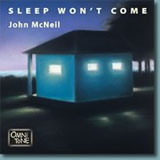Home » Jazz Articles » Album Review » John McNeil: Sleep Won't Come
John McNeil: Sleep Won't Come
McNeil has a wicked, almost relentless sense of humour as he takes the listener through a sleepless night on Sleep Won't Come. Collaborating with pianist Jeff Jenkins and bassist Kent McLagan, there's enough texture available to simulate the frustrating mind cramps that happen, but the trio is also sensitive enough to portray attempts at relaxation and emptying the mind. The album opens with the title track, a peaceful tone poem that finds Jenkins developing long, sustaining chords, over which Jenkins muses in a quiet and tranquil way. But it doesn't last long, and in short order the trio is into "The Other World," where cacophonous, ham-fisted piano chords and jagged trumpet lines create a sense of busyness. McNeil, Jenkins and McLagan seem to work in tandem while, at the same time, seeming somehow at odds with each other, simulating that sense of an unquiet mind that just can't stop working.
Other tracks find the McNeil trying, time and again, to create a sense of peace, but they never last long. From a lush reading of "The Water is Wide," where McLagan delivers the theme with a stately arco, to the longer "Each Moment Remains," where Jenkins' sustained arpeggios create a thick ambience over which McNeil's muted trumpet evokes a certain In a Silent Way Miles mood, the trio tries hard to settle things down and create a quiet space conducive to drifting off. But for every attempt at relaxation comes a more jarring alternative. On "Wired Together" Jenkins's prepared piano is punctuated by siren-like trumpet wails, while on "Escape from Beigeland," with its Ornette-like bop line and free middle section, the trio sits somewhere between the organized and the disorganized. But all is not purely serious; McNeil brings some humour to the table with "Polka Party," simulating those times where, in the midst of all that sleeplessness, the mind has "a brilliant idea—writing it down and then reading it the next day and realizing it's how to make toast."
All analogies aside, McNeil is a fine and highly underrated player who has also written one of the most acclaimed trumpet method books around. With a breadth of style, a clear sense of humour and understanding of the human condition, Sleep Won't Come works because, in many ways, it is simply all too familiar.
Visit John McNeil on the web.
Track Listing
Sleep Won't Come; The Other World; The Water is Wide; Wired Together; Each Moment Remains; Escape from Beigeland; Penumbra; Polka Party; Somnabulation; Nanotech; World Without Velcro.
Personnel
John McNeil
trumpetJohn McNeil: trumpet; Jeff Jenkins: piano, prepared piano; Kent McLagan: bass.
Album information
Title: Sleep Won't Come | Year Released: 2004 | Record Label: OmniTone
< Previous
Bow River Falls
Next >
Latin Jazz Fantasy
Comments
Tags
For the Love of Jazz
 All About Jazz has been a pillar of jazz since 1995, championing it as an art form and, more importantly, supporting the musicians who create it. Our enduring commitment has made "AAJ" one of the most culturally important websites of its kind, read by hundreds of thousands of fans, musicians and industry figures every month.
All About Jazz has been a pillar of jazz since 1995, championing it as an art form and, more importantly, supporting the musicians who create it. Our enduring commitment has made "AAJ" one of the most culturally important websites of its kind, read by hundreds of thousands of fans, musicians and industry figures every month.




















